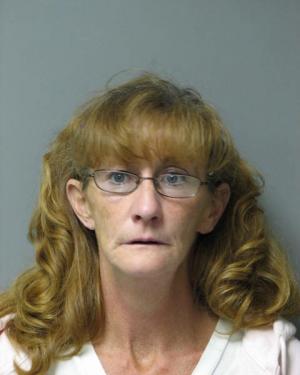Mother jailed in death of daughter
A grieving mother who provided prescription drugs to her 17-year-old daughter was taken out of a Sussex County courtroom in handcuffs June 22. Leslie Laughlin was sentenced for giving the prescription drug Vicodin to her daughter, Emily Laughlin, on the night Emily died of a prescription drug overdose.
Attorneys and Judge T. Henley Graves said Laughlin did not cause her daughter’s death July 15, 2011. But Graves said the mother created an environment for Emily where prescription pills were taken as casually as Aspirin. “It’s a sad situation,” he said.
Graves sentenced Laughlin to complete the Key, Crest program at Sussex Correctional Institution in Georgetown. Key, Crest is an aggressive drug treatment and rehabilitation program that follows the offender from incarceration to work release to probation.
Department of Justice Public Information Officer Jason Miller said the program generally takes 18 to 24 months to complete.
Before she was sentenced, Laughlin told Graves she began meeting with a probation officer in December, and she took her first drug test in March or April. Laughlin said she took two Percocets, a painkiller, from a friend on Mother’s Day because she fell in the cemetery and twisted her ankle.
“You still have a serious drug problem,” Graves said. Taking unprescribed Percocet after her daughter had died of a narcotic overdose is evidence of the problem, he said.
Laughlin, 46, pleaded guilty to endangering the welfare of a child and distribution of hydrocodone, or Vicodin, May 9.
According to the state, Emily, a student at Cape Henlopen High School, was found to have smoked marijuana and taken painkillers Vicodin and oxycodone and the muscle relaxer Soma the night she died. Prosecutor Christopher Hutchison said the case illustrates a societal problem. “We just have a cavalier attitude toward these pills,” he said. “Pills are just as dangerous as heroin.”
As Hutchinson reviewed the events leading up to Emily’s overdose – the mother and daughter smoked marijuana and took pills together with friends – Laughlin was visibly upset. Ripples formed in the back of her shirt where her frail body shook underneath.
“There is no question the defendant is remorseful,” Hutchinson said. “There needs to be a punishment aspect to this.”
Defense attorney Rob Robinson recommended home confinement for Laughlin. “She needs significant help dealing with her grief,” he said.
Robinson said Laughlin and Emily were close, but the relationship resembled a friendship more than a mother-daughter relationship. “Obviously, this was not something she intended to do,” he said.
Robinson pointed out a number of Emily’s friends, who sat wide-eyed behind Laughlin’s sister in the back row of the gallery. He said they were too nervous to address the court, but they wanted to show their support for Laughlin.
Laughlin’s sister, Wendy Rybacki, spoke frantically and choked back tears to address the court. She said Laughlin was a godly woman who helped Rybacki through a divorce.
Rybacki said Laughlin lost her home, and she and Emily moved in with her. “Emily was a very sad and depressed girl,” Rybacki said. “She was a cutter.”
Rybacki said Emily refused counseling and would go to school, beg her peers for drugs and use drugs on campus. It wasn’t my sister’s fault that that happened,” she said. “I would really appreciate if you would let her come home with us.”
Laughlin also testified. “The past 334 days, I’ve woken up without Em,” she said. Laughlin said going through holidays, birthdays and graduations without her daughter was unbearable, and she asked Graves to allow her to grieve with her family. “I just ask for your mercy,” she said.
As Laughlin was handcuffed and escorted out of the courtroom, she looked back at her sister in the gallery and her mouth formed the words, “I love you.”





















































